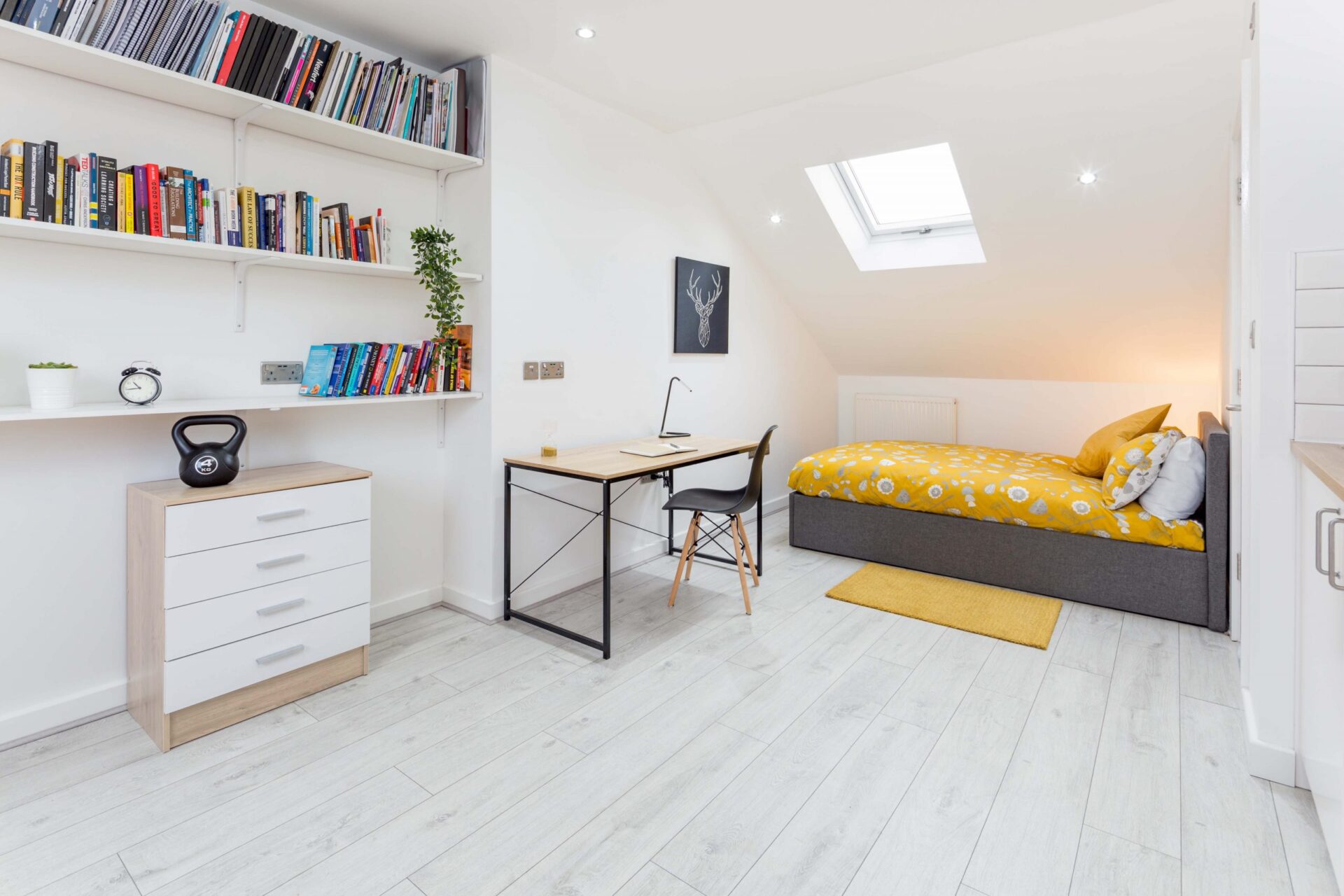
HMOs, known for potentially leading to higher profits than standard rental properties, also bear increased risks to landlords and property owners. This makes comprehending HMO insurance not just advantageous but essential. From shielding against potential property damage and liability to mitigating the impact of lost rental income, a comprehensive grasp of HMO Insurance is a decisive step in safeguarding your investment against the multifaceted challenges unique to HMO management. So, let’s break down this critical aspect of property investment.
What makes an HMO Insurance?
HMO Insurance, tailored for Houses in Multiple Occupation, is a specialised form of coverage that caters to the unique requirements and risks associated with properties rented out to multiple tenants who share common facilities like kitchens and bathrooms.
This type of insurance, for instance, goes beyond the coverage provided by standard landlord policies. It addresses specific risks associated with HMOs, including those arising from multiple individual tenancies within a single property:
- Higher tenant turnover
- Increased wear and tear
- Liability issues
Typically, HMO insurance incorporates coverage for issues such as property damage, liability, and potential loss of rental income. The key here is to make sure it’s designed in a way that landlords and investors receive adequate protection against the exceptional challenges of managing an HMO property.
For landlords and investors in the UK property market, understanding insurance for HMOs – even if this isn’t a legal obligations as crucial as the regulatory framework of these properties. This guide examines HMO insurance, its nuances and necessities, from the HMOs unique protection requirements to the various types of policies. We delve deep into what makes HMO insurance distinct, breaking down coverage options and factors influencing insurance costs, so you can back your HMO insurance choice.
Types of HMO Insurance: Finding the Perfect Fit for Your Property
- Different types of policies: The first thing to know about HMO insurance is that the concept of a universal policy simply doesn’t exist. Policies can vary greatly, offering coverage for property damage, liability, and potential loss of rental income. Understanding these differences is critical to selecting the right policy for your property.
- Coverage options: Beyond the standard coverage, landlords should consider additional options tailored to the HMO market. This includes the standard range and other necessities like rent guarantee insurance and legal expenses coverage, which are crucial for the unique needs of HMO properties.
- Choosing the Right Policy: The right insurance policy hinges on numerous factors. We guide you through these considerations, helping you assess your needs and ensuring your HMO property is adequately protected.
Breaking Down Coverage Options
Standard policies typically cover the basics –building insurance to protect against structural damage, contents insurance for any furnished items provided by the landlord, and liability insurance to safeguard against claims from injuries or accidents on the property. However, the complexities of HMOs often necessitate going beyond these basics.
You must consider crucial protections like rent guarantee insurance, which acts as a safety net against loss of income due to tenant defaults. Legal expense cover is another essential, providing financial cushioning in legal disputes, whether with tenants or regulatory bodies. Further, given the shared nature of HMOs, insurance policies can be extended to include communal areas and accidental damage cover, ensuring comprehensive protection against the risks associated with shared living spaces.
Assessing Property Needs
The key to selecting the right insurance for your HMO lies in a thorough assessment of your property’s unique needs. It’s not just about the size or location; it’s about understanding the tenant demographics, evaluating the risks associated with the property’s specific features, and considering the area’s history in terms of claims or natural disasters. For instance, properties in flood-prone areas or cities with a high rate of rental disputes might require more specialised coverage.
Additionally, the age and condition of the property can play a significant role. Older properties might need more extensive building insurance, while modern, high-spec HMOs might demand higher contents insurance. It’s also important to factor in the replacement costs of any high-value items supplied.
The process of assessing property needs for insurance purposes should be dynamic, reflecting any changes or upgrades to the property. Regular reviews ensure that coverage remains relevant and adequate, providing peace of mind that your investment is well-protected.
By carefully dissecting the available coverage options and aligning them with the unique characteristics of your HMO property, you can focus on an insurance policy that not only meets legal requirements but also provides robust protection for your investment. This approach ensures that every aspect of your HMO is covered, enabling you to focus on maximising your property’s potential in the rental market.
Factors Affecting HMO Insurance Costs
The calculation of insurance premiums for HMOs is influenced by a blend of factors –each playing its unique role– from your claims history to the tenants and the particularities of your property, including:
- Property size and layout: Larger properties or those with complex layouts often attract higher premiums due to the increased potential for claims.
- Location: Properties located in areas prone to natural disasters, high crime rates, or with a history of frequent insurance claims, typically face higher premiums.
- Occupancy rates: The number of tenants and the frequency of tenant turnover can also impact premiums. Higher occupancy rates or frequent changes in tenancy can increase the likelihood of claims, thereby raising the premium.
- Security measures: Effective security systems, such as burglar alarms and CCTV, can reduce the risk of theft and vandalism, potentially lowering insurance costs.
- Property age and condition: Older properties or those needing repair may be considered higher risk, leading to increased premiums.
Minimising Costs
Well-timed strategies can help you keep your insurance costs manageable without compromising on coverage:
- Regular risk assessments: Conducting and documenting regular risk assessments can demonstrate to insurers that you are proactive about minimising risks, which may help reduce premiums.
- Enhancing security measures: Investing in robust security systems can deter potential damages and also influence insurers to offer more favourable rates.
- Maintaining the property: Keeping the property in good condition can decrease the likelihood of claims due to structural issues, thus helping to keep insurance costs down.
- Negotiating with insurers: Don’t shy away from negotiating with insurance providers. With a clear understanding of your property’s risk profile and market rates, you can often secure more competitive premiums.
Impact of Property Characteristics
Each HMO is unique, and its specific characteristics directly impact insurance premiums. For example:
- Specialised facilities: Properties with specialised facilities like communal gyms or pools may face higher premiums due to the increased risk of liability claims.
- Historical value: Properties of historical significance or with architectural importance can attract higher premiums because of the potential higher costs of repairs and restorations.
- Sustainability features: On the other hand, properties with sustainability features, such as solar panels or energy-efficient appliances, could benefit your case for lowering premiums as they present a reduced environmental risk profile.
By understanding these factors and adopting strategies to mitigate risks, HMO landlords can manage their insurance costs more effectively. Your approach should focus on keeping premiums in check while securing comprehensive coverage.
Specialised HMO Insurance Companies: Navigating the Market
As you’re well aware, the importance of choosing the right provider for HMO insurance warrants careful consideration. This section provides a thorough overview of specialised HMO insurance companies, offering policy comparisons and guiding you through the evaluation process.
Overview of Providers
When exploring this landscape, it’s essential to recognise that each HMO insurance brings its unique blend of policy offerings, coverage options, and cost structures.
Insurance providers specialising in covering HMOs have crafted their services to address the specific needs of this market, recognising the particular challenges these properties involve. Tailoring their offerings to different HMO sizes, some insurers focus on larger HMOs, providing extensive property damage and liability coverage. In contrast, others target smaller HMOs, offering more affordable and streamlined policies. The costs can vary significantly among providers, often reflecting the range of the coverage and the specific risks associated with the property.
Comparing Policies
Making an informed decision requires a thorough comparison of policies from different providers. Don’t stop at comparing premiums; you must carry out a detailed evaluation of what each policy covers, and seek comprehensive answers:
- Does the policy include coverage for unoccupied periods?
- How does it handle tenant liability?
- Are there provisions for emergency accommodation costs?
These are some of the critical questions to ask when comparing policies. Moreover, it’s essential to consider the flexibility of the policies –can they be customised to suit the specific needs of your HMO property?
Assessing Providers
Past the policy details, assessing insurance providers’ credibility and reliability is paramount to protecting your interests. As part of the process, make sure you consider these key aspects, as they can impact more than customer satisfaction:
- Financial stability: Investigate the financial health of the insurer. A company with solid financial footing is more likely to be reliable in claim situations.
- Customer service: Evaluate their customer service and claims handling process. Timely and efficient customer service is crucial, especially in emergency situations.
- Reputation and reviews: Look for reviews and testimonials from other HMO landlords. These insights can provide valuable information about the insurer’s track record.
- Regulatory compliance: Ensure that the provider complies with all regulatory requirements. This is an indicator of their commitment to ethical business practices.
By carefully assessing these factors, you can select an insurance provider that offers a policy that meets your needs and stands as a reliable and trustworthy partner in protecting your HMO investment.
Key Differences Between HMO Insurance and Other Insurance Plans
HMO insurance differs significantly from standard landlord and building insurance, both in terms of coverage and exclusions. While landlord insurance typically covers a single-tenant property against risks like property damage, liability, and potential loss of rental income, HMO insurance must account for the complexities of multiple tenants living under one roof, from more extensive liability common of shared to more comprehensive loss of rent coverage, aligning with higher tenant turnover and associated risks in HMO properties.
On the other hand, building insurance generally focuses on the property’s structure, protecting against damages from fires, floods, or vandalism. Moreover, some insurance policies may even offer coverage over specific needs, such as shared content or individual tenant liability.
Tailoring Insurance for HMOs
The importance of choosing insurance tailored explicitly for HMOs can’t be overstated. Standard policies are unlikely to adequately cover the unique challenges HMO properties present. Tailored HMO insurance offers coverage that aligns with structural and operational aspects of HMO management. It addresses the unique blend of risks associated with managing a property with multiple tenants, who often have separate tenancy agreements and may have different living habits and schedules.
In conclusion, while HMO insurance shares some similarities with other property insurance plans, its specific focus on the unique challenges of HMO management makes it a necessary consideration for landlords and investors in this market. Understanding these differences and tailoring your insurance to fit your HMO’s specific needs is crucial in ensuring comprehensive protection and peace of mind in your property investment journey.
Seeking Professional Advice for HMO Insurance
The complexities of HMO insurance can be intimidating, making professional advice invaluable. Consulting experts in this field is more than just a prudent step; it’s a strategic move, and here is why.
Consulting Experts
Effectively managing HMO insurance demands a profound understanding of the industry, loaded with nuances unapparent to the untrained eye. This is where the expertise of insurance professionals experienced in HMO insurance becomes crucial. These experts bring a wealth of knowledge and insight, understanding the unique challenges and nuances of insuring HMO properties. They can provide guidance on the types of coverage most pertinent to your property, advise on potential risks, and help navigate the regulatory environment. Consulting with these professionals can prevent costly oversights and ensure your insurance policy fully covers the specific needs of your HMO.
Guidance in Policy Selection
Selecting the right insurance policy for an HMO is a critical decision that can significantly impact your financial security. Insurance agents or brokers play a vital role in this process. They can help you sift through the myriad of options available, matching policy offerings to your property’s requirements. Their market knowledge can guide you towards policies that offer the best value for you, balancing comprehensive coverage with cost-effectiveness. Moreover, they can assist in understanding the fine print of policy documents, ensuring you are aware of all coverage details, exclusions, and conditions.
Effective Insurance Quotes Assessment
Gathering and assessing multiple insurance quotes is essential to the insurance buying process. Here are some tips for doing this effectively:
- Compare like-for-like: Ensure that the quotes you’re comparing offer similar levels of coverage. Differences in deductibles, limits, and exclusions can significantly impact the overall effectiveness of a policy.
- Look beyond price: While cost is an essential factor, it shouldn’t be the only consideration. Assess the comprehensiveness of coverage, the insurer’s reputation, and the level of customer service.
- Review annually: Insurance needs can change over time. Regularly reviewing and comparing insurance quotes ensures your HMO remains adequately covered as its conditions evolve.
Seeking professional advice and carefully assessing insurance quotes are fundamental steps in securing the right insurance for your HMO. These actions ensure that you not only comply with legal requirements but also safeguard your investment against unforeseen risks and challenges.
Getting the right insurance is one of the key responsibilities of the landlord of any HMO. For more on landlord responsibilities, you can consult our checklist.
This comprehensive guide aims to help you make informed decisions about HMO insurance. With an understanding of coverage options, costs, and the specialised nature of HMO insurance, you can safeguard your property and investment. For further assistance with your HMO project, schedule a complimentary discovery call; we’ll be happy to help you.
Giovanni is a highly accomplished architect hailing from Siena, Italy. With an impressive career spanning multiple countries, he has gained extensive experience as a Lead Architect at Foster + Partners, where he worked on a number of iconic Apple stores, including the prestigious Champs-Élysées flagship Apple store in Paris. As the co-founder and principal architect of WindsorPatania Architects, Giovanni has leveraged his extensive experience to spearhead a range of innovative projects.




